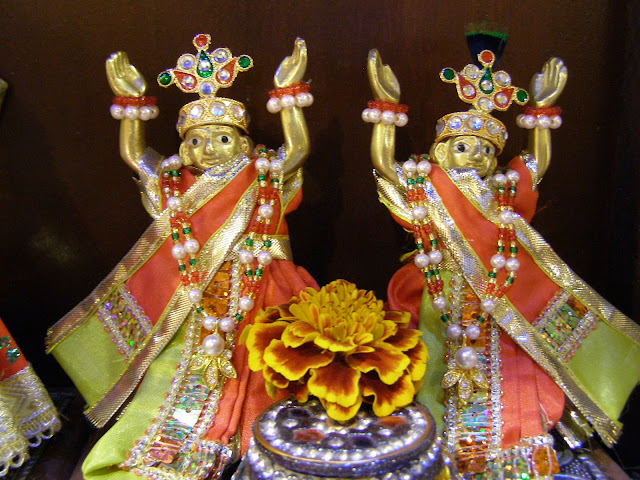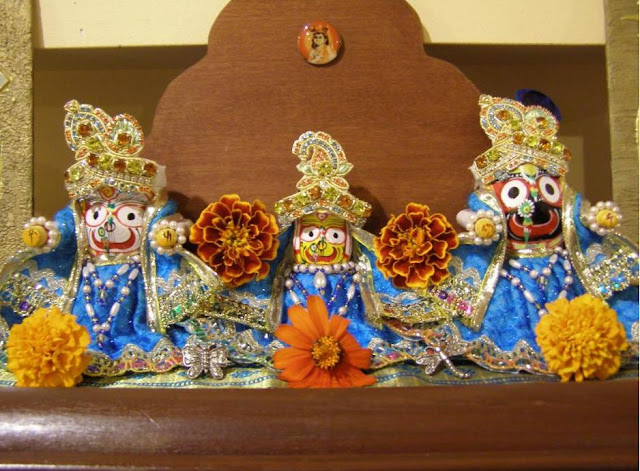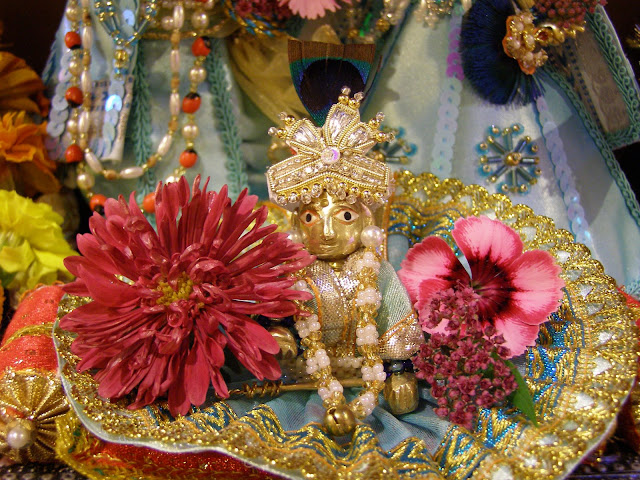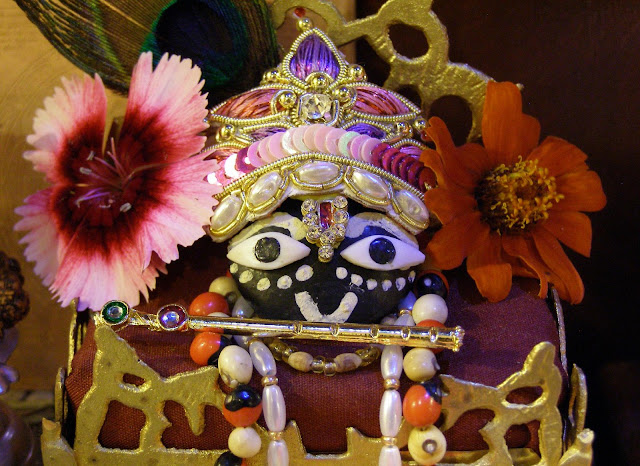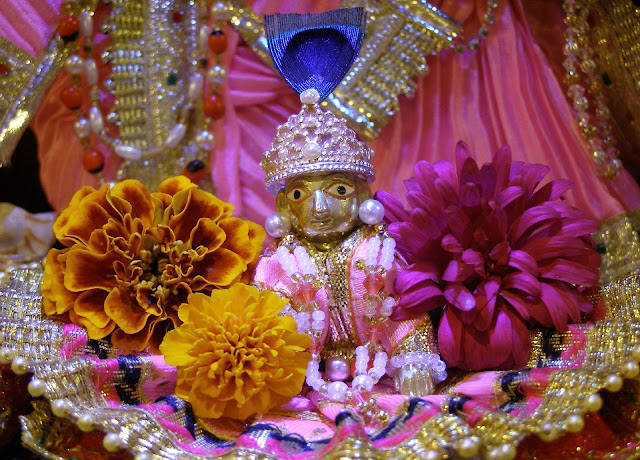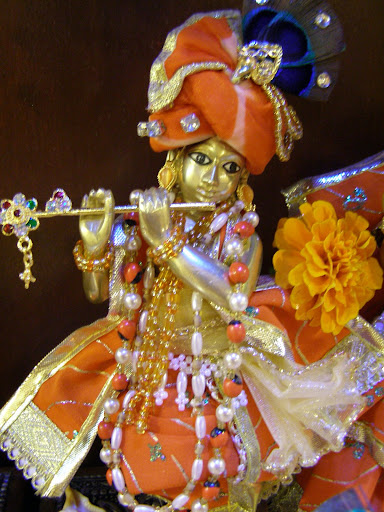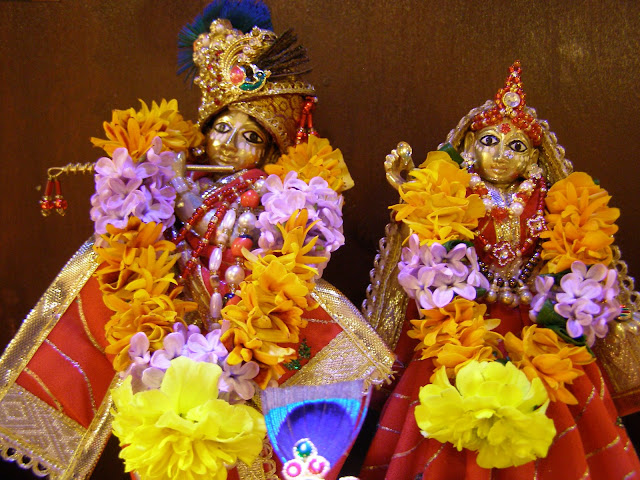Prabhupada: But everyone wants sunshine. Why in one place denied, and one place there is sunshine? You are not free. Even though you want sunshine, there is no sunshine. So how you feel free? You bring sunshine. But that is not happening. There is superior arrangement. So to accept that superior arrangement, that is real business, not to declare freedom falsely. That is not possible. If I say, "I am free from the law-abiding process, law given by government; I am free from the law of the government," that is not possible. If you become outlaw, then you will be arrested and put into jail. So what is the use of declaring that "I am free from the government laws"? There is no freedom. Whatever little freedom is given to us, if you utilize it properly, that is very nice. If we unnecessarily declare that "I am free from any obligation," that is madman's proposal. That is the mistake of the modern man, that, especially in the Western countries, unnecessarily they are declaring freedom in so many ways. Unnecessarily. He is not free, but he is declaring. That is described in Caitanya-caritamrta, I think, or in some other. No? Prema-vivarta. Yes, there is a book, Prema-vivartapisaci paile yena mati-cchanna haya
maya-grasta jivera se dasa upajaya
The freedom is declared by persons who are completely under the clutches of maya. He declares freedom. And he is so much haunted by the ghost maya that he thinks his bondage as freedom. Just like a drug-addicted person or drunkard. He is thinking, "I am free." He lies down on the street sometimes in madness: "Who can forbid me?" You have seen madmen lying on the street... I have seen it, all traffic stopped. So this kind of freedom has no meaning. It is involving oneself with the strict laws of maya. There is no freedom. And just like a child. If he becomes free from the parents, it is not good; it is dangerous. His life is at risk. If a child without the help of the parents go on the street, is... That freedom is nice? That kind of freedom. Therefore Krsna says that "Whatever little freedom you have got, just surrender that freedom to Me." Sarva-dharman parityajya mam ekam saranam [Bg. 18.66]. (to someone:) You can come forward.
Jayatirtha: These are guests.
Rsabhadeva: These are some professors, Srila Prabhupada, who form part of our congregation.
Prabhupada: Give him front seat. Give him a pad.
Jayatirtha: The professors can come up here in the front. [break]
Rsabhadeva: ...and Mr. Surface, professors, of theology and economics respectively.
Prabhupada: Thank you very much. I was talking with this boy about freedom. And so I say that there is no freedom for us. We are always dependent. So what is your opinion about it?
Mr. Surface: I agree with that.
Prabhupada: Thank you. Take Bhagavad-gita. Find out this verse. Prakrteh kriyamanani gunaih karmani sarva... Who can read very distinctly? You will do or he will do? Give to him.
prakrteh kriyamanani
gunaih karmani sarvasah
ahankara-vimudhatma
kartaham iti manyate
[Bg. 3.27]
Satsvarupa:
prakrteh kriyamanani
gunaih karmani sarvasah
ahankara-vimudhatma
kartaham iti manyate
[Bg. 3.27]
"The bewildered spirit soul, under the influence of the three modes of material nature, thinks himself to be the doer of activities, which are in actuality carried out by nature."
Prabhupada: Purport.
Satsvarupa: Purport. "Two persons, one in Krsna consciousness and the other in material consciousness, working on the same level, may appear to be working on the same platform, but there is a wide gulf of difference in their respective positions. The person in material consciousness is convinced by false ego that he is the doer of everything. He does not know that the mechanism of the body is produced by material nature, which works under the supervision of the Supreme Lord. The materialistic person has no knowledge that ultimately he is under the control of Krsna. The person in false ego takes all credit for doing everything independently, and that is the symptom of his nescience. He does not know that this gross and subtle body is the creation of material nature, under the order of the Supreme Personality of Godhead, and as such his bodily and mental activities should be engaged in the service of Krsna, in Krsna consciousness. The ignorant man forgets that the Supreme Personality of Godhead is known as Hrsikesa, or the master of the senses of the material body, for due to his long misuse of the senses in sense gratification, he is factually bewildered by the false ego, which makes him forget his eternal relationship with Krsna."
Prabhupada: So this is false ego, to think of oneself as free. You are professor of economics?
Mr. Surface: Yes.
Prabhupada: I think I may remember. There is economist professor, Marshall? Marshall's economics?
Mr. Surface: Yes.
Prabhupada: You know him? You must be knowing. I think he gives definition of economic impetus-family affection. I was also a student of economics in my student life, Scottish Churches' College. So we had to read this Marshall economics, I think. That definition, that what is the economic impetus, why people want to earn money? So the reason, he gives-due to some family affection. Am I right?
Mr. Surface: I didn't understand the last part.
Prabhupada: Family affection.
Brahmananda: Family affection is the impetus for economic...
Prabhupada: Development.
Mr. Surface: Oh, yes.
Prabhupada: Yes. So he is dependent on the family affection. Then economic impetus go on. And I think he has given another proposition that if man can easily live, then he will not work. That is the nature of man. Therefore a rich man's son, he does not work. Because he has father's money, he can spend. In America the boys are rich man's son, and therefore so many boys are not working. They have got easy income, and they are not working. And because there is no proper work, they are becoming hippies. They are manufacturing independence. "Idle brain is a devil's workshop." This human psychology is the same everywhere. In India many rich men's son, until he has spoiled his father's whole money, he is restless. And when he is turned to a beggar, then he is satisfied. I have seen many, spoiling father's money like anything, and the same man, when he is beggar in the street, he feels happy. I shall quote one statement of a very big man, politician, Mr. C.R. Das. So he died in 1925. He was about our father's age. So he was earning in those days fifty thousand rupees per month. Fifty thousand... our rupee or dollar is the same. Although exchange value is different, but the... Locally, the purchasing capacity is the same. So he and his wife were sitting on the corridor, and the wife was talking that "Why you are so morose always? You are earning like anything. You have got respect as political leader. Everyone likes you. You have no want. Why you are sorry? How you can become happy? What is your program?" So on the street one mendicant was going on. He said, "I want to become like that mendicant; then I will be happy." And at last, he became like that. So sometimes one who is possessing more than required, he wants to become a beggar again. So I repeatedly say this to American boys, that "By the grace of God you are very much opulent materially. So if you don't take to Krsna consciousness, then you will have to become beggar again because we know these two things: sometimes beggar, sometimes rich; sometimes beggar, rich..." We do not know third way. Renouncing and possessing. But both these two things are wrong because you haven't got anything, so what you can renounce? Just like this morning I came here, and they have given me this room to stay. And if I say next morning, "I renounce this," the question will be, "When you possessed this room that you are renouncing?" And if I say, "I possess it," that is also wrong, because somebody has given me this apartment to live for some time. So where I possessed, and how I renounced? But we know these two things only. Sometime we possess. Economic development means to possess. And to become hippie means you renounce. We know these two things. But we cannot possess; we cannot renounce. That is real knowledge. What do you think?
Mr. Surface: I'm just enjoying listening.
Prabhupada: No, you must give your opinion. (laughter) You are learned scholars. Our philosophy is that we cannot possess, cannot renounce. So what do you think about it?
Mr. Surface: I'm not quite sure what that means precisely.
Prabhupada: Just like this table belongs to somebody else. How can I possess it? And if the table belongs to somebody else, how can I renounce it? Renouncing means if I possess something. But if you have nothing to possess, where is the question of renouncing? And if the things belongs to somebody else, how can I possess it? This is my proposal. You cannot possess other things. And then you will be thief. If I possess other's possession, then I am thief. And if I renounce, then I am false renouncer, but I did not possess anything. So where is the question of possession and renouncing come? But the whole world is struggling. Some group is struggling for possessing, which is called economic development, and some group is trying to renounce it. Just like a rich man's son. Without any, his labor, he possesses the father's immense property. He wants to renounce it. And the poor man is trying to possess it. These two classes of men are working. One is trying to possess, and the other is trying to renounce. There is no other third group.
Rsi-kumara: What about those who are just possessing enough to maintain their bodies?
Prabhupada: Yes. Body is maintained by the birds and beasts. The worms, ants, they also maintaining body, but they do not possess anything. So therefore, natural law is that without possessing, you can maintain yourself.
Rsi-kumara: You have to possess some food and some shelter.
Prabhupada: No, no. The food is supplied. Who is supplying food? If there is a hole in your room and so many thousands of ants are coming out, who is supplying food? Are you supplying that "Here is a hole. There are ants. They must be given some food"? Of course, that is your duty according to Vedic civilization. But who is doing that? But he is quite healthy. There are so many fishes in the water, many millions. Who is giving food them? There are many elephants in African jungles. They eat at a time forty kilos. So who is supplying food? This is not the problem. If the bird, beast, animals, fishes, aquatics and cats, dogs, everyone, can get food, what you have done that you will not get your food? You are human being. This is the right conclusion, that "If food is supplied to the elephants and to the ant by some superior arrangement, what I have done that I will not get my food?" Tasyaiva hetoh prayateta kovidah. Find out this verse. It is not in Bhagavad-gita. In Bhagavata.
Jayatirtha: First Canto?
Prabhupada: Yes.
tasyaiva hetoh prayateta kovido
na labhyate yad bhramatam upary adhah
tal labhyate duhkhavad anyatah sukham
kalena sarvatra gabhira-ramhasa
[SB 1.5.18]
Tasya eva hetoh. These are our Krsna books. To convince the people, scholars, philosophers, scientists, economists, we have written fifty books like that.
Satsvarupa:
tasyaiva hetoh prayateta kovido
na labhyate yad bhramatam upary adhah
tal labhyate duhkhavad anyatah sukham
kalena sarvatra gabhira-ramhasa
[SB 1.5.18]
"Persons who are actually intelligent and philosophically inclined should endeavor only for that purposeful end which is not obtainable even by wandering from the topmost planet, Brahmaloka, down to the lowest planet, Patala. As far as happiness derived from sense enjoyment is concerned, it can be obtained automatically in course of time, just as in course of time we obtain miseries even though we do not desire them."
Prabhupada: Purport.
Satsvarupa: "Every man everywhere is trying to obtain the greatest amount of sense enjoyment by various endeavors. Some of them are busy engaged in trade, industry, economic development, political supremacy, etc., and some of them are engaged in fruitive work to become happy in the next life by attaining higher planets. It is said that on the moon the inhabitants are fit for greater sense enjoyment by drinking soma-rasa, and the Pitrloka is obtained by good charitable work. So there are various programs for sense enjoyment, either during this life or in the life after death. Some are trying to reach the moon or other planets by some mechanical arrangement, for they are very anxious to get into such planets without doing good work. But it is not to happen. By the law of the Supreme, different places are meant for different grades of living beings according to the work they might have performed. By good work only, as prescribed in the scriptures, one can obtain birth in a good family, opulence, good education and good bodily features. We see also that even in this life one obtains a good education or money or bodily beauty. Similarly, in our next birth we get such desirable positions only by good work. Otherwise, it would not so happen that two persons born in the same place at the same time are seen differently placed according to previous work. But all such material positions are not permanent. The positions in the topmost Brahmaloka and in the lowest Patala are also changeable according to our work. The philosophically inclined person must not be tempted by such changeable positions. He should try to get into the permanent life of bliss and knowledge, where he will not be forced to come back again to the miserable material world, either in this or that planet. Miseries and mixed happiness are two features of material life, and they are obtained in Brahmaloka and in other lokas also. They are obtained in the life of the demigods and also in the life of the dogs and hogs. The miseries and mixed happiness of all living beings are only of different degree and quality, but no one is free from the miseries of birth, death, old age and disease. Similarly, everyone has his destined happiness also. No one can get more or less of these things simply by personal endeavors. Even if they are obtained, they can be lost again. One should not, therefore, waste time with these flimsy things; but one should only endeavor to go back to Godhead. That should be the mission of everyone's life."
Prabhupada: So this is our mission. We are propagating this. Do you think it is all right?
Mr. Surface: Do I think it's all right? Well, it's a point of view.
Prabhupada: No, what we are doing... We are teaching people that "Don't bother about your economic condition of life. It will come automatically, what you are destined to obtain. You better utilize your energy how to get out of this condition of life, birth, death, old age and disease."
Mr. Surface: Isn't there room for both?
Prabhupada: This is our philosophy. We are preaching that.
Mr. Surface: There would not be room for both?
Prabhupada: Both means?
Mr. Surface: For the two.
Jayatirtha: Both economic development and spiritual advancement.
Prabhupada: Yes. You can... Actually there is no need of economic development. But if you think it is required, you can do that. But don't forget your real business. That is our proposal. We don't condemn, but economic development... Just like in America. When I did not come here... Of course, I know that everywhere everything is there. But I thought that "America is very rich, there is no poverty. There is no crime because they are rich." But when I came here I saw everything is the..., as in India so in America. There is crime; there is poverty; everything is there. At least, they are voluntarily accepting poverty, just like hippies. Most of them are coming from rich family, rich father. But he has volunteered to lie down on the street. Why? Why he doesn't care for economic development?
Mr. Surface: Maybe he's had too much.
Prabhupada: Whatever it may be, but that we see in India. On account of poverty, many men are lying on the footpath. And here also, in Europe, America, we see. Although he is coming from rich family, government is rich, government is endeavoring to take them back to nice place, they will not go. So these three classes of men-rich, middle class and poor -- everywhere, either it is rich country or poor country. Then we have to accept: by nature it is so arranged that these three classes of men will exist. Then the question is "Where is the benefit of economic development?" If these three classes of men will exist anywhere, so where is the use of economic development? Even one is placed in developed economic condition, rich family, rich, he is accepting poverty voluntarily. And there is a big park in Amsterdam, that... You have been there?
Brahmananda: I've heard of it.
Devotee (1): It's called the Vondal Park.
Prabhupada: Thousands of hippies are lying down there. In London I have seen in St. James Park, early, because I go for morning walk, that the police is kicking, "Ho! get up! Get up!" And government has engaged men: "Why you are living like this? Come here. If you have no home, we are giving home." They don't care. Therefore the sastra says that simply try to make man Krsna conscious. That is required. Tasyaiva hetoh prayateta kovido [SB 1.5.18]. In other life, either high-grade life, low-grade life, there was no chance of becoming Krsna conscious. But the human life there is chance. Krsna conscious means, when we speak Krsna, God. So that is... There is the chance. So the sastra says, instead of endeavoring for other things, better you try to become Krsna conscious. That will solve all the problems.
Jayatirtha: The hippies see that their fathers have not become happy by their riches.
Prabhupada: Yes, they have got some reason, certainly. So they refuse to adopt the way of life of their father or grandfather. So they must have some reason. But on the total we can see that these three classes of men -- one in great prosperity, one via-media, and one in want... These three classes of men there are, everywhere, all over the world. Rather...
Guest: Sir, are you familiar with Yogananda's Self-Realization Fellowship and the practice of recruiting wealthy people as patrons for people who are sincerely interested in following a spiritual pursuit?
Prabhupada: Hm, what is...?
Ramesvara: He asked if you were, Srila Prabhupada, if you were familiar with another yoga society founded by one swami called Yogananda. He called it the Self-Realization Fellowship. And they have a practice to recruit wealthy men as their members. He simply asked if you knew of that.
Guest: Do you think that this hinders with their development?
Prabhupada: No. Spirit soul is the same thing either in wealthy man or poor man. The spirit soul is not different. Therefore in the Bhagavad-gita it is said,
vidya-vinaya-sampanne
brahmane gavi hastini
suni caiva sva-pake ca
panditah sama-darsinah
[Bg. 5.18]
If Yogananda thinks like that -- "Only rich man is able to practice yoga" -- that is wrong. A poor man can also practice yoga. Because yoga means connecting, linking up with the Supreme. So as spirit soul, everyone is fit to connect himself with the Supreme. That is the statement in the Bhagavatam. Sa vai pumsam paro dharmo yato bhaktir adhoksaje [SB 1.2.6]. That is first-class self-realization when one tries to connect himself with the Supreme. And the Supreme can be connected by anyone. That is also stated in the Bhagavad-gita, mam hi partha vyapasritya ye 'pi syuh papa-yonayah [Bg. 9.32]. According to Vedic philosophy, one becomes poor on account of his sinful activities. So papa-yoni... So although he has taken birth in a degraded family or poor family, spiritually he is pure. Simply one has to revive his spiritual consciousness. And that cannot be checked by any material condition. Ahaituky apratihata. Spiritual self-realization cannot be checked by any material condition. So why? Rather, opulent condition is not favorable for practicing yoga. That is stated in the Bhagavad-gita, bhogaisvarya-prasaktanam tayapahrta-cetasam [Bg. 2.44]. Those who are too much attached to material enjoyment, they cannot practice yoga.
Guest: The reason why I asked was because other spiritual masters such as Jesus and the Buddha have required first that people give all of their possession to the poor rather than give them to a community fund such as the Self-Realization Fellowship, the Society for Krsna Consciousness, or any other...
Prabhupada: Yes, that is right, because after all... Why to the poor? We say... I do not know whether Jesus Christ, Lord Buddha, said, but generally people are inclined to give to the poor. That, suppose you have got some money. I go: "Sir, give us some contribution for spending for Krsna consciousness." He will not like very much. And if I go, ask some money, that "I am going to open some hospital for the poor suffering humanity," he will give immediately. Is it not the general tendency? If I say a moneyed man, "Please give me some money. I will spend it for Krsna," he will not give. (chuckles) But if I approach him that "I am going to open a charitable institution for the poor," he will give me. So these Jesus Christ and Lord Buddha has said like that just to try to this, make this man dispossess. But he will not be inclined to pay for Krsna; he will be inclined for the poor. The real purpose is to make him dispossess. Unless he is penniless, he will not take to God. So the real purpose is to make him dispossess. But he will not be inclined to pay his money for God. So let him pay to the poor, that's all. Otherwise, if anyone has got money, he should return it to God because it is God's money. Isavasyam idam sarvam yat kincit jagatyam jagat [Iso mantra 1]. Find out this, Isopanisad. Everything belongs to God. That I was speaking, that we don't possess anything. This big ocean, is it our property? But we are claiming, "This portion of Pacific is mine." How it became yours? Did your father manufacture it? But we are claiming falsely, "This is mine. This is American portion, and this is Japanese portion. This is that portion and..." We do not possess it; we falsely claim it. This is our position. Actually it is the possession of God. God has created this land, this ocean, the sky, the air, the fire. You have not created. So how claim? We are claiming, "This space is our. You cannot fly your plane on this space." Do they not do like that? But how the space came to your possession? You have not created it. This is misunderstanding. I do not possess it; still, I claim, "It is my property." And there is fight. You are claiming something your property, I am claiming something as my property, but none of them belongs to you or me.
Brahmananda: Srila Prabhupada, in America there's a great deal of material development but very little spiritual development.
Prabhupada: Therefore, we have given you the Krsna consciousness, that material development is very good provided it is added with spiritual consciousness. Zero is very good when it is added with one. Otherwise, thousands of zeros together is still zero. But if there is one, then it increases value. If you have got ten zeros, so together, ten zero, it is zero. But if you add one, that ten zeros means -- some millions?
Ramesvara: No, billion.
Prabhupada: Billion. So zero is there, and one is there. You add together. Then the value will increase. Otherwise you remain zero. And because the so much material opulence is zero, therefore the hippies are disappointed. It is zero. What they will do with the zero?
Devotee (2): Srila Prabhupada, our parents in America teach us that we ought to be doing good things for other people. Should we be engaged for our fellow people?
Prabhupada: But that you do not know, how to do good to the people. Just like a diseased man. The doctor has ordered that he should starve. But if you go in the hospital and you take sympathy with the starving patient, "Oh, you are starving for the last three days," if you give to him some food without the permission of the physician, then you will be punished. So he may think that "Oh, here is a starving man. I must give him some food." But you are liable to be punished. So first of all learn how to do good to others. So that is described here. Tasyaiva hetoh prayateta kovido [SB 1.5.18]. To bring him to the knowledge of self-realization, that is good. If you can distribute knowledge to bring him back to his consciousness, original consciousness, that is real welfare activity. Otherwise, if you manufacture something that "This man is starving: let me give him some food," it may be wrongly done, and you are liable to be punished. So first of all, you must learn what is actually good to the human society. Then, if we do that, that is good. In ignorance, if we do it, then we may be liable to be punished. Besides that, your thought is imperfect. Just like you try to give food to some living being, but other living being you send to the slaughterhouse. You do not consider. You put your philosophy, that "The animal has no soul. They are like dead matter," but that is not the fact. The animals also have got soul, and the human being, he has got also soul. The ant has got also soul. Everyone has got. Every living being has got soul. Why you are inclined to do good to the human society? What is the reason? Why not to the animals?
Devotee (3): Because we see ourselves in other humans more than we see ourselves in animals.
Prabhupada: Hmm? So...?
Upendra: He identifies. Identification.
Prabhupada: Identification. So that identification is there in the animal life also. The animal, dog, also tries to protect his cub. So that sense is not sufficient to be human being. That sense is visible amongst the lower animals. In Kanpur I was sitting within the room, and one monkey came outside the window, and she had her child. So somehow or other, playing, that child entered into my room through the railings, and the mother remained outside. The mother became mad how to get the child. Then I pushed the child out of the room and she immediately embraced, and... The affection is there. You will find everywhere. In the birds, beasts, animals, lower animals, big animals, the same affection is there. If you strike one crow, then thousands of crow will gather: "Caw. Caw. Caw." You have seen? In India it is very... (chuckles) And they will bite you. If you have done any harm to any crow, all the crows will come.
Mr. Surface: Were some of the animals destined to survive through the destruction of other animals?
Prabhupada: Yes. You are also destroying so many cows daily, although you are human being. Do you consider that "Why this cow should be slaughtered?" They are also living beings. So what about the animals? If man can slaughter so many animals daily, then if a tiger kills another one animal, what is the wrong there? That is the distinction between man and animal. Everyone has to eat somebody, and nature's law is one living being is eating another living being. Jivo jivasya jivanam. So the snake is eating the frog, the frog is eating another small animal or some flies, and the snake is eaten by the mongoose, and the mongoose eaten by somebody else, by cat or by dog. So this is the law of nature. Therefore the human being is suggested that "You should take Krsna prasadam. Eating is required, but you don't eat like the lower animals. You take Krsna prasadam. In the Bhagavad-gita it is said, patram puspam phalam toyam yo me bhaktya prayacchati: [Bg. 9.26] "Anyone who is offering Me with devotion and love leaves, vegetables, fruits, flowers, milk, that I take." So we take Krsna prasadam, the remnants of foodstuff left by Krsna. So that is our philosophy -- we take Krsna prasadam. Although there is also... Maybe not killing. Because if I take this flower from the tree, the tree is not killed. If I take grains from the paddy... What is called?
Bhojadeva: Plant?
Prabhupada: Yes. So it dies before. All these food grain plants, when the food grains are ripened, they dry. So it is not required to kill the plant. When it is already dead, you can take the food grains. When you take milk, the cow is not killed. The milk is nothing but transformation of the blood. So we are taking milk means blood. The blood is in a red color, and milk is in white color, but it is blood. Unless it is blood, how so much liquid comes from the body? So we take the same blood in a very intelligible way so that cow may live, he can continue to give me more and more, and I take more benefit from the wonderful food, milk. This is intelligence. And because cow blood is very beneficial for health, if I kill the cow, that is not very good intelligence. In our New Vrindaban the cows are giving more milk than others because they know we shall not kill them. They are happy. You'll get from Bhagavatam... Find out this verse in the First Canto, I think, kamam vavarsa parjanyah. Kamam vavarsa parjanyah sarva-kama-dugha mahi [SB 1.10.4]. Find this verse. [break]
Satsvarupa:
(kamam) vavarsa parjanyah
sarva-kama-dugha mahi
sisicuh sma vrajan gavah
payasodhasvatir muda
[SB 1.10.4]
"During the reign of Maharaja Yudhisthira, the clouds showered..."
Prabhupada: (aside:) The windows this side cannot be opened?
Satsvarupa: "... all the water that people needed, and the earth produced all the necessities of man in profusion. Due to its fatty milk bags and cheerful attitude, the cow used to moisten the grazing ground with milk."
Prabhupada: You can open this, these windows. There is no window? Just hear this.
Nara-narayana: Close?
Prabhupada: No, open this glass window so ventilation may come. Ah. So? Yes, so read the translation.
Satsvarupa: "During the reign of Maharaja Yudhisthira, the clouds showered all the water that people needed, and the earth produced all the necessities of man in profusion. Due to its fatty milk bag and cheerful attitude, the cow used to moisten the grazing ground with milk."
Prabhupada: That's all. Because the cows were very cheerful, the milk was dropping from the milk bag so that the grazing ground became muddy. It was muddy not with water but with milk. So how much milk was being delivered by the cows. Because, the reason is... Why? They remained cheerful. What is that? Second line?
Satsvarupa: "Due to its fatty milk bag and cheerful attitude,..."
Prabhupada: "Cheerful attitude." If cows know. They have got intelligence that "We will be killed." Therefore they are not supplying sufficient milk. They cannot, just like if your mind is full of anxiety, you cannot work fully. So because they are denied this cheerfulness, you are getting less milk. If you keep them cheerful, they will give more milk. This is nature's economic development. Artificially you cannot increase the production of milk. But according to the instruction of scripture, if you keep them cheerful without any fear, they will deliver double milk. So therefore in the Bhagavad-gita it is recommended that cows should be protected in the human society. If you want to eat meat, you can kill insignificant, small animal, but don't kill cows. There are other animals-hogs, pigs, goats, lambs or birds, so many, fish -- if you are at all interested in meat-eating; but don't kill cow. Find out this verse from Bhagavad-gita, krsi-go-raksya-vanijyam vaisya-karma svabhava-jam [Bg. 18.44]. Those who are vaisyas... Economic development... Vaisya means economic development. They should produce ample food grains and give protection to the cows. Just like our Krsna's life, His foster father was a vaisya. So he is keeping so many hundred thousands of cows, and Krsna was entrusted to take charge of the calves, Krsna-Balarama. So although They were very rich father's son, still They were taking the calves in the forest for tending in childhood. Still... You have seen in Mayapur? The small children, they are taking care very nicely of the cows. After all, it is animal. The small child has got a stick, and he has been trained up how to allow them to graze. They have done. So according to Bhagavad-gita... But that is very nice, that economic development means you produce more food grains and more milk. Then it will solve all posit... There will be no scarcity of food or happiness. Our, these Krsna society young boys and girls, they have prepared so many nice things from milk. It is nutritious, very palatable, every..., everything. And we take food grains, fruits, milk preparation, that's all. That is very easily available. You can get enough fruits if you cultivate trees and plants. That is recommended in Bhagavad-gita. Patram puspam phalam toyam yo me bhaktya prayacchati [Bg. 9.26]. What I have given, purport of that verse?
Satsvarupa: Krsi-go-raksya?
Prabhupada: No, kamam vavarsa parjanyah [SB 1.10.4].
Satsvarupa: Oh, yes. Purport. "The basic principle of economic development is centered about land and cows. The necessity of human society are food grains, fruits, milk, minerals, clothing, wood, etc. One requires all these items to fulfill the material needs of the body. Certainly one does not require flesh and fish or iron tools and machinery. During the regime of Maharaja Yudhisthira, all over the world there were regulated rainfalls. Rainfalls are not in the control of the human being. The heavenly King Indradeva is the controller of rains, and he is the servant of the Lord. When the Lord is obeyed by the king and the people under the king's administration, there are regulated rains from the horizon, and these rains are the cause of all varieties of production on the land. Regulated rains not only help ample production of grains and fruits, but when they combine with astronomical influences there is ample production of valuable stones and pearls. Grains and vegetables can sumptuously feed a man and animals, and a fatty cow delivers enough milk to supply a man sumptuously with vigor and vitality. If there is enough milk, enough grains, enough fruit, enough cotton, enough silk and enough jewels, then why do the people need cinemas, houses of prostitution, slaughterhouses, etc.? What is the need of an artificial luxurious life of cinema, cars, radio, flesh and hotels? Has this civilization produced anything but quarreling individually and nationally? Has this civilization enhanced the cause of equality and fraternity by sending thousands of men into a hellish factory and the warfields at the whims of a particular man? It is said here that the cows used to moisten the pasturing land with milk because their milk bags were fatty and the animals were joyful. Do they not require, therefore, proper protection for a joyful life by being fed with a sufficient quantity of grass in the field? Why should men kill cows for their selfish purposes? Why should men not be satisfied with grains, fruits and milk, which, combined together, can produce hundreds and thousands of palatable dishes. Why are there slaughterhouses all over the world to kill innocent animals? Maharaja Pariksit, grandson of Maharaja Yudhisthira, while touring his vast kingdom, saw a black man attempting to kill a cow. The King at once arrested the butcher and chastised him sufficiently. Should not a king or an executive head protect the lives of the poor animals who are unable to defend themselves? Is this humanity? Are not the animals of a country citizens also? Then why are they allowed to be butchered in organized slaughterhouses? Are these the signs of equality and fraternity and nonviolence? Therefore, in contrast with the modern, advanced, civilized form of government, an autocracy like Maharaja Yudhisthira's is by far superior to so-called democracy in which animals are killed and a man less than an animal is allowed to cast votes for another less than animal man. We are all creatures of material nature. In the Bhagavad-gita it is said that the Lord Himself is the seed-giving father and material nature is the mother of all living beings in all shapes. Thus mother material nature has enough foodstuff both for animals and men, by the grace of the father almighty, Sri Krsna. The human being is the elder brother of all living beings. He is endowed with intelligence more powerful than the animals for realizing the course of nature and the indications of the almighty father. Human civilizations should depend on the production of material nature without artificially attempting economic development to turn the world into a chaos of artificial greed and power only for the purpose of artificial luxuries and sense gratification. This is but the life of dogs and hogs."
Prabhupada: Now men are killing their own children. Is it not? Even cats and dogs do not do this. Although they give birth at a time half a dozen children, still they are not anxious to kill them. (pause) So I am coming in one minute. Please sit down. Hare Krsna. [break] Why you are there?
Mr. Surface: I must leave. Thank you.
Prabhupada: Hare Krsna. Give him some prasada.
Nara-narayana: There is so much mismanagement in different parts of the world that there are so many revolutions now in all parts of the world including India, Africa and even the United States. There are so many problems based on the fact that their food grains and milk supply are not being supplied nicely or distributed nicely. Now, supposing that there is a demand that there should be good management for it, how these things should be distributed properly, by what system, so that people can get these things in a way that they can become God conscious and at the same time have their...?
Prabhupada: God consciousness does not depend on distribution of food. It requires cultural education. It does not mean that one who has got enough food, he is God conscious. The food distribution is not one of the conditions for becoming God conscious. That is wrong project. "If people are given sufficient food, they will become God conscious" -- that is not the fact. But people advance this theory, that "We are now economically distressed. We cannot turn our attention to God consciousness." That is a wrong plea. God consciousness does not depend on any material condition.
Rsabhadeva: Srila Prabhupada, earlier you had said that nature provides each species its foodstuff. But in other species other than man we see that it's immediately obtainable. But man has to work for it, and he has to wait for the fruits of his labor. Why is that nature's arrangement?
Prabhupada: Nature's arrangement... In this material world you cannot eat without working. Even if you are lion-lion is considered to be the most powerful animal -- he has to capture one animal. He cannot think that "Let me sleep, and the animal will come automatically in my mouth." It is not possible. You have to work; this is the material world. So that work is simple work. If you have got land... Everyone has got land. You just work little, and it will produce your food grains. And the food grains will give food to the animal and man. The animal, cow, he will eat the grass, and you will take the grains. Why should you kill the animal? You haven't got to arrange for his food. You produce paddy. The plant, when it is dried, it is good for animals, and you take the grains. Why should you kill him? And he will deliver you. If you protect his life, he will give you nice milk. So you keep animal, cows, and grow food grain; then your food problem is solved. So if your food problem is solved and your cloth problems is solved, then where is your economic necessity? Then you save time and cultivate Krsna consciousness. So real business will be how to cultivate, how to become advanced in God consciousness. That the animal cannot do. You are claiming more intelligence than the animals, so use your intelligence in this way. Don't spoil day and night for your economic development. So-called economic development means as soon as you become stout and strong, then sense gratification. Then you cultivate the culture of nudism. That Los Angeles beach, "Beach for nudies." Is not written there?
Jayatirtha: Yes. One morning one nude man was running. While we were walking one morning, one nude man was running on the beach.
Prabhupada: This is...
Devotee (4): They're also trying to establish a beach like that here in Laguna Beach also, Prabhupada, a nude beach.
Prabhupada: So without God consciousness, when there is no cloth, then economic development, and when... [break] Refer these verses from Bhagavad-gita: amanitvam adambhitvam ahimsa ksantir arjavam... (aside:) Little water.
Satsvarupa:
amanitvam adambhitvam
ahimsa ksantir arjavam
acaryopasanam saucam
sthairyam atma-vinigrahah
[Bg. 13.8]
Prabhupada: Go on.
Satsvarupa:
indriyarthesu vairagyam
anahankara eva ca
janma-mrtyu-jara-vyadhi
duhkha-dosanudarsanam
asaktir anabhisvangah
putra-dara-grhadisu
nityam ca sama-cittatvam
istanistopapattisu
mayi cananya-yogena
bhaktir avyabhicarini
vivikta-desa-sevitvam
aratir jana-samsadi
adhyatma-jnana-nityatvam
tattva-jnanartha-darsanam
etaj jnanam iti proktam
ajnanam yad ato 'nyatha
[Bg. 13.8-12]
Prabhupada: This is knowledge. Etaj jnanam. The items prescribed by Krsna, that is knowledge. And everything is no knowledge. Translation, you read.
Satsvarupa: "Humility, pridelessness, nonviolence, tolerance, simplicity, approaching a bona fide spiritual master, cleanliness, steadiness and self-control; renunciation of the objects of sense gratification, absence of false ego, the perception of the evil of birth, death, old age and disease; nonattachment to children, wife, home and the rest, and evenmindedness amid pleasant and unpleasant events; constant and unalloyed devotion to Me, resorting to solitary places, detachment from the general mass of people, accepting the importance of self-realization, and philosophical search for the Absolute Truth -- all these I thus declare to be knowledge,..."
Prabhupada: This is knowledge, path of knowledge.
Satsvarupa: "... and what is contrary to these is ignorance."
Prabhupada: That's it. There are eighteen or twenty items of knowledge. The human society is not interested with those eighteen items, and they are simply interested in so-called economic development, technology, mental speculation. That is ignorance. That is not knowledge. They do not know what is knowledge. Just like the first item is... What is that? Amanitvam.
Satsvarupa: Humility.
Prabhupada: Humility. So who is teaching? Where is the school teaching humility? This is the first item. Then? Next?
Satsvarupa: Adambhitvam, pridelessness.
Prabhupada: Pridelessness. Everyone is proud. Then?
Satsvarupa: Ahimsa, nonviolence.
Prabhupada: Nonviolence. These are the first three steps toward the path of knowledge, and who is practicing this? Nobody is practicing. You are professor of?
Professor: Yes, I'm an instructor, yes.
Devotee: What subject matter?
Professor: In religious studies.
Prabhupada: What is your definition of religion?
Professor: My definition of religion? I think religion has mostly to do with the kinds of questions people ask. Religion is the attempt to answer questions about "Who am I? and "Who is God?" and "How do I relate to God?"
Prabhupada: That is nice. That is the meaning. So do the people in general know what is God?
Professor: People in general... Today most people have an idea, but they don't all agree. So you can't say that they all have an idea of God. But they all believe they do.
Prabhupada: No, believing is different thing. You can believe anything. But God is one. So God is there, you believe or not believe. Just like the president of your state is there. One may say, "I don't believe in him." That does not mean there is no president. Similarly, a foolish man can say that there is no God, but that does not mean there is no God. There is God. Now who is that God?
Professor: Who is God?
Prabhupada: Just like in your state, everyone knows there is a president. And one can enquire, "Who is now president?" Is it not natural?
Professor: Is it not...? Everyone knows who the president is.
Prabhupada: No, knows or not knows. Suppose I am a foreigner. I know...
Professor: Oh, yes.
Prabhupada: ...that there is a president. Then I can ask, "Who is your president?"
Professor: Right.
Prabhupada: That is natural. So first of all, the believers, they know that there is God. Now the next question will be "Who is God?" That is advanced knowledge.
Professor: Certainly lots of people have different answers.
Prabhupada: Why there should be different...? President is one, and everyone knows he is one. Why there be lots... That means they do not know. If there is... Just like now Mr. Ford is president. So nobody can say, "Now Mr. John is president." Mr. Ford is president. You cannot say, "Mr. John is president," "Mr. such and such is president," "I suggest," "I..." "It may be like that." Why may be? Actually Mr. Ford is president. And one who says, "May be like this," he does not know who is the president. As soon as he says, "God may be like this," that means he does not know what is God. So there cannot be different description of God. God is one. One must know who is that God. That is education. Now, we are teaching that, "Here is God, Krsna." Now it is up to you to test whether Krsna is God or not God. But if you know what is God, then you have to accept Krsna.
Professor: If you know who is God, accept it?
Prabhupada: If you know what is God, then you will accept Krsna is God.
Professor: Oh.
Prabhupada: If you do not know actually what is God, then you will deny. Or if you deny, then present who is God, if you know. Then you will have to say, "I do not know what is God." So anyone who is trying to study religion and God, they should try to understand our philosophy, this Krsna consciousness.
Satsvarupa: The professor says they have the Bhagavad-gita in his college.
Prabhupada: Oh. You have got this Bhagavad-gita As It Is?
Professor: Yes, in the library.
Prabhupada: You can...? You have read our this Bhagavad-gita?
Professor: I have read it, yes.
Prabhupada: According to Vedic understanding, krsnas tu bhagavan svayam [SB 1.3.28]. You understand Sanskrit? No. Krsna... there are description of the incarnations. There is name of Krsna. Then it is summarized. Find out this verse,
ete camsa-kalah pumsah
krsnas tu bhagavan svayam
indrari-vyakulam lokam
mrdayanti yuge yuge
[SB 1.3.28]
Satsvarupa:
ete camsa-kalah pumsah
krsnas tu bhagavan svayam
indrari-vyakulam lokam
mrdayanti yuge yuge
[SB 1.3.28]
"All of the above-mentioned incarnations are either plenary portions or portions of the plenary portions of the Lord. But Lord Sri Krsna is the original Personality of Godhead. All of them appear on planets whenever there is a disturbance created by the atheists. The Lord incarnates to protect the theists."
Prabhupada: So now the Lord has incarnated in the form of Hare Krsna sound to deliver the atheist. The world is full of atheist. Therefore this movement is there.
Professor: It's like the story about the blind men and the elephant, I think. A lot of people know one incarnation and think that that is all of God, and they do not know that that is only one incarnation or is only one manifestation.
Prabhupada: No, incarnations there are many. Many incarnations. There is a verse there. But Krsna is the origin of incarnation. He is the original source of all incarnation. Krsnas tu bhagavan svayam [SB 1.3.28]. So as you are teacher of religion, so you try to understand this Krsna philosophy.
Devotee (4): Srila Prabhupada, during the last year I went to many different colleges and universities. And I could see that these professors are very much argumentative. They like to argue. They like to debate. So I tried to start one debating program so that they could come and they could bring their philosophy. And I told them that I could show them their philosophy and how it was defective from the Bhagavad-gita. I wanted to know if this was a good program for the universities.
Prabhupada: What is the philosophy?
Devotee (4): There were some engineers that came. And they said that everything that we see manifested in this material world is made by the engineers.
Prabhupada: So Krsna is the greatest engineer.
Devotee (4): Yes.
Prabhupada: We say that. But ask the professor that "You are engineer; you are not so powerful. There is another big engineer who has done it. So God means you try to understand who is that biggest engineer."
Devotee (4): They were saying that all the highways and all the nice buildings...
Prabhupada: And all the oceans? Here is the highway, and there is the ocean. Which is important? (laughter) You might have created these highways, but another engineer has created that ocean, side by side. So who will get the greater credit?
Devotee (4): They say that there's a limited amount of resources here on this planet, that unless we use these resources wisely, then they will all be used up. They say that there's very limited amounts, so therefore they must be careful.
Prabhupada: But this... Who supplied the resources of this ocean? They say that water is combination of hydrogen and oxygen, so wherefrom this hydrogen-oxygen supply came?
Devotee (4): There is another group. They call themselves Zero Population Growth. So their idea is that there's too many people on this planet. So therefore either they want... What they want to do is that they want to increase the number of deaths...
Prabhupada: Death.
Devotee (4): Yes. (laughter) And decrease the number of births. It is called Zero Population Growth, and they are actually thinking like this.
Prabhupada: And who is going to decrease the population of the mosquito? It is increasing. This means real business they are forgetting.
Devotee (4): So in every school they have so many organizations. Is this a good idea, that we can have debating programs like this along with selling books.
Prabhupada: Yes, let them study another line of education. Just like there is religious section. It has nothing to do with the engineering, but there is section. Similarly, in religious section or in another section these things should you study, Bhagavata. That is good. Srimad Bhagavad-gita, Bhagavata.
Jayatirtha: Shall we take your leave now, Srila Prabhupada?
Ramesvara: Jaya, thank you, Srila Prabhupada. (end)


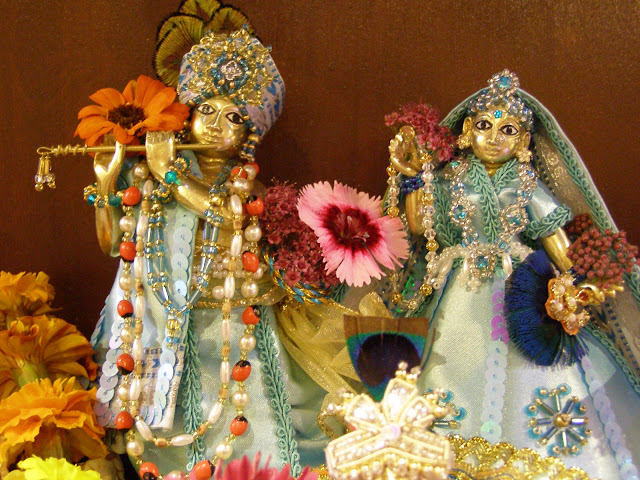
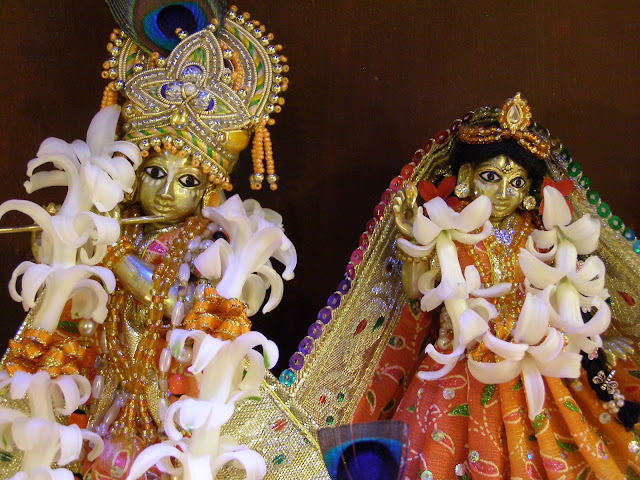
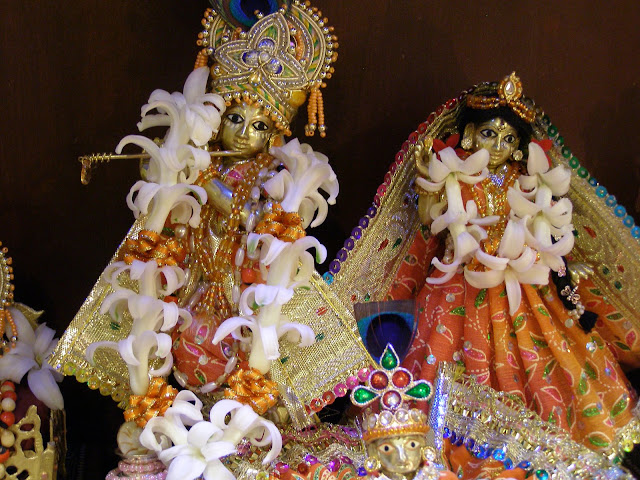

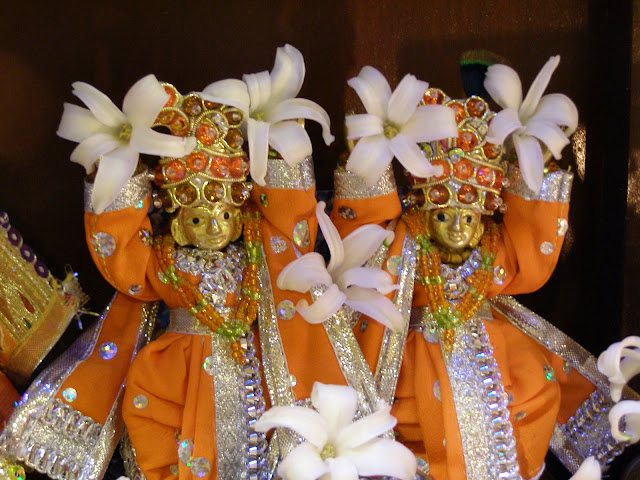

 By Citraka dasa
By Citraka dasa
